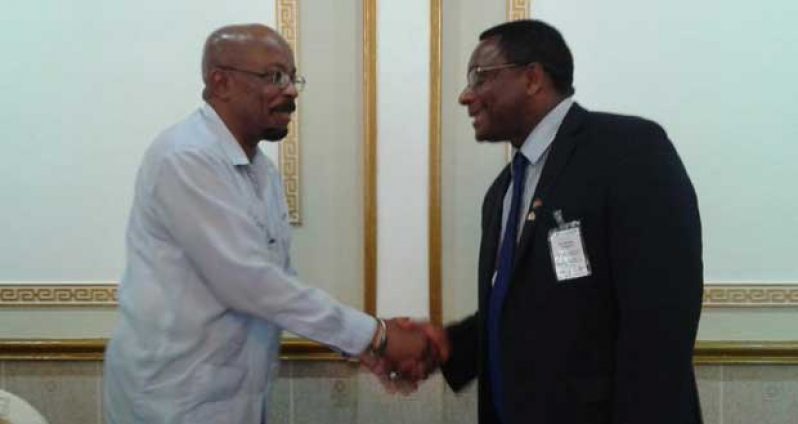CANADIAN Municipalities Board Member Michael Thompson yesterday completed Phase Two of his visit to Guyana with the holding of a local economic development seminar at the Regency Hotel, held under the theme “The Role of Elected Officials in Local Economic Development.”
The seminar, falling under the Caribbean Local Economic Development (CARILED) Project, was attended by Canadian authorities, Local Government Minister Norman Whittaker, Ministry officials, NDCs and RDCs.
CARILED is a Government of Canada funded six-year project being implemented by the Department of Foreign Affairs and Trade Development (DFATD). It focuses on local economic development (LED), and spans seven Caribbean countries. Its mandate is to develop models of LED that can be shared throughout the Caribbean Region.

Delivering the opening address at the seminar was Programme Director of CARILED, Alix Yule, who gave a brief history of the project, which was first launched in May 2012. She noted that the project seeks to work with Local Government Ministries, and through selective communities, to advance economic development in the region. As such, projects are being executed in regions Two, Three, Four and Six.
She explained that during the execution of the three-year project, CARILED will be working along with communities to assist them to be more pro-active in local economic development. She underscored how important the role of the NDCs and RDCs are in aiding economic development, and she stressed the need for work to commence at the community level.
Local Government Minister Norman Whittaker highlighted the fact that the role of elected officials in local economic development is set out in the constitution and in individual pieces of legislation that guide the roles and functions of the various local government organs.
“One only has to look at Chapter seven (7) of our Constitution and Section 74 of 28:01 or 28:02, where the roles of the local government organs are set out,” Minister Whittaker said.
He stressed that the roles of elected officials are guided by regulations, guidelines, policies and plans that have been developed over time; and those, to a large extent, guide how and what is done by the elected officials. “They guide how we procure resources and how legally we ought to use those resources,” Whittaker said.
The minister said the next important thing ought to be the leadership role of elected leaders in leading along the path to improved development. Accordingly, he emphasized the importance of leaders re-engaging the population and providing mediums for collaboration, so as to promote involvement of the people. This, he said, would not only create involvement at an implementation stage of the project, but at the conceptualization phase, where project strategies would be discussed.
The minister boasted that most of the development in communities is through NDCs and the municipalities, but he pointed out that there is a failure at all levels to engage the people in public awareness exercises, which results in trickle-down effects, such as rates and taxes not being paid.
“Because we do not engage them in large numbers in a meaningful way in the decisions as to what we do, they feel that the next road that is being built is being built by the Ministry of Public Works; they feel that the next drain that is being desilted is being done by the Ministry of Agriculture; they feel that the next bridge that is being fixed is done by the Ministry of Local Government; but eight out of ten times it is the NDC doing this little project that means so much to the people,” Whittaker noted.
“Leadership is critical as we seek to deal with the challenges of development,” he continued, while stressing that we need to create the type of environment that is conducive to investment.
The Local Government Minister related that the process of economic development is built on collaboration with the key drivers, being central government, local government, non-governmental organisations (NGOs) and the private sector. These agencies, he said, must possess the same objective — which is working to create better conditions for economic growth and job creation.
“The roles of elected officials extend beyond attending meetings and sitting in offices. We must share experiences and ideas on how we can move forward our local economic development,” he urged.
The seminar, which was expected to conclude at 15:30 hours, would have sought to challenge the officials present to engage in meaningful discussions and to express ideas through which the formulation of policies could be achieved, thereby assisting in fostering economic development for the region.
The keynote address was expected to be delivered by highly acclaimed Canadian official Michael Thompson, a member of the City Council of Toronto and an associate of the Federation of Canadian Municipalities’ (FCM) Board of Directors.
Thompson will also, on July 25, visit and commission the Tapakuma Women’s Agriculture Diversification Project in Region Two. He will continue his trips to the Diamond Neighbourhood Democratic Council (NDC) to look at some of the benefits of the Community Roads Improvement Programme (CRIP). Under the institutional development and capacity-building aspect of the CRIP, which was supported by the FCM, the Diamond NDC benefited from the construction of a new NDC office, and also from capacity training and the purchase of a new computer system.
(By Ravin Singh)



.jpg)








